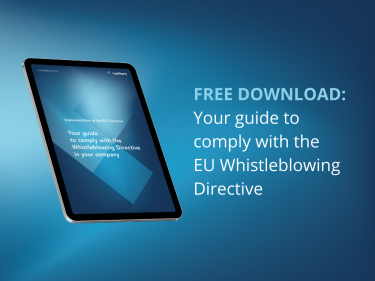What does the introduction of a whistleblowing system have to do with your liability risk?
If you have already read the fifth part of our Whistleblowing Basics series “The EU Whistleblowing Directive”, you may be asking yourself now: “If the Directive has not yet been translated into German law, why should I introduce a whistleblowing system today?” An understandable consideration. There are many reasons why you would need a whistleblowing system in your company yesterday rather than tomorrow. However, the two most important are the following: First, you need time for making the choice and implementing the appropriate whistleblowing system. Secondly, without an implemented and functioning whistleblowing system, your liability risk increases enormously. Therefore we want to explain the principles of shareholder liability and principal liability in the context of internal whistleblowing to you in the following.
General definition of liability
Before we explain what a whistleblowing system has to do with your liability risk, we would like to briefly define the two relevant principles:
The principle of shareholder liability
Company law presumes compliance with the compulsory prosecution as the basis for the actions of companies. Individual, corporate or state action is legal if it complies with applicable law and statute. For companies, this means that criminal violations should not be committed from within a company just as they should not be committed by private individuals.
The principle of principal's liability
The management (i.e. managing directors or board members) must ensure compliance with the compulsory prosecution within the company. If they fail to do so, they may be found liable. This is where the principal’s liability comes into play: According to this principle, the manager who is authorised to give instructions is liable if he does not prevent his employees from committing criminal offences in business transactions. The principal’s liability arises on the one hand from criminal and regulatory law and can lead to fines or penalties. On the other hand, civil liability of the managers towards the company for compensation of the damage incurred is also conceivable.
How can a whistleblowing system reduce your liability risk?
And what does all of this have to do with whistleblowing systems?
Imagine the following scenario: A criminal offence is discovered in your company. Now, one of your employees comes forward and says: “I observed this months ago. But I didn’t dare to address it personally and “snitch” on someone. However, I do not know of a confidential or even anonymous way to report the incident within our company. A friend of mine told me that his company at least has a whistleblowing system that you can always use for such cases.”
Now the public prosecutor’s office is investigating. Among other things, the public prosecutor’s office will check whether there is a compliance management system in your company. If this is not the case, you as the managing director may be charged with a violation of compliance with the principle of legality. According to current jurisdiction, a compliance management system is a requirement for compliance with the principle of legality. Compliance systems serve to avoid criminal offences and this is exactly what matters. If you as a managing director have done “everything” to avoid criminal offences, you have fulfilled your duty and minimised your liability risk: The crucial element of such a compliance system is the whistleblowing system.
A violation of the legality principle is punished with six-digit fines and the confiscation of the entire benefits generated by the offence.
Conclusion: Liability risk due to lack of whistleblower system
If a criminal offence is committed in a company and there is no compliance system, the shareholders are liable on the basis of the compulsory prosecution and the principal’s liability. By introducing a whistleblowing system, you can minimise this liability risk and above all: you can detect criminal offences in time or even prevent them at an early stage.
If you want to learn more about whistleblowing systems or the legal framework, feel free to take a look at our Know-How page. If you have already decided to introduce a whistleblowing system in your company, you can find everything you need to know how to successfully introduce a whistleblowing system in your company in “Your guide to comply with the Whistleblowing Directive in your company“. If you have any questions, feel free to contact one of our experts.












